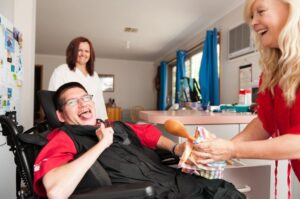Reflections on Health Care Access from AAC Users
 The following insights, reflections, and advice were typed in the chat box by AAC user participants during the fall 2020 Assuring Better Communication for Deciding (ABCD) Together in Health Care Project webinars, and are shared with permission.
The following insights, reflections, and advice were typed in the chat box by AAC user participants during the fall 2020 Assuring Better Communication for Deciding (ABCD) Together in Health Care Project webinars, and are shared with permission.
A formatted version of these insights can be downloaded in accessible PDF format here. The main ABCD Project page can be accessed here.
Describing Problems Talking to Doctors, Generally
- “Doctors don’t always ask me or talk to me.” - Alex Toole
- “When people keep pretending we aren’t here, keep pretending we haven’t been here, then it is hard to actually get anywhere.” - TuttleTurtle
- “A lot of doctors won’t engage directly with you if you bring a support person/need an interpreter/have someone else in the room. How are we supposed to engage directly with doctors who don't see us as actual people to have conversations with?” - Donnie TC Denome
- “Even when support people push for doctors to ask me questions, there is an unwillingness to do so. Or they will ask me a question to appease my parents for a minute, but not actually take my thoughts into account as they make a medical plan.” - Jordyn Zimmerman
- “I also wish there were more options for communicating access needs to medical workers other than just health care providers. I don’t know how I’m supposed to let the front-desk workers in my doctors’ office that I can …” - Donnie TC Denome
- “I’ve had to explain so many times that I don’t have a guardian, no really, I don’t have a guardian, and I actually understand what they’re saying to me as long as they are willing to take some extra time to explain.” - Cole Sorensen
- “There is a whole lot of ableism around cognitive ability. Those of us with intellectual disabilities or whose minds aren’t fine should be given the same respect, access to care, and making our own choices and autonomy as everyone else.” - ST
- “I think doctors are somewhat more likely to listen to me when I have an interpreter because they assume I’m Deaf but “normal” cognitively whereas if they see or know I’m autistic/mentally ill they are more dismissive.” - endever* corbin
- “We shouldn’t have to prove anything to be treated like people.” - ST
- “It’s a constant game of, ‘Do I present myself as competent so that I get respect,’ or present myself as Very Disabled ... so that I get my support needs met.” - endever* corbin
- “I have definitely actively purposefully represented myself as ‘I seem not quite normal because of migraines’ and hide being autistic and that’s meant I am [given] dramatically different treatment.” - TuttleTurtle
- “How do you convince your doctor that you are competent enough to understand your own gender?” - Cole Sorensen
- “What are we supposed to do when doctors won’t explain things that we don’t even know to ask about?” - Donnie TC Denome
- “I feel like either they don’t give feedback bc they haven’t let me make a choice in the first place, or when I try to make a choice of my own accord then they overrule based on what they think of it.” - endever* corbin
- “If I tell a doctor ‘x med doesn’t work for me,’ what usually happens is that they say, ‘okay, here’s y med’ or try to convince me that x med will work for me. There’s not a back and forth.” - Donnie TC Denome
- “If you … disagree they pull the ‘mental health’ or ‘cognitive’ card to say why you don’t actually have a right to choose.” - Carly Pfister
- “I am continually scared to request basic accommodations for doctors (like ‘please give me more time to answer’) because I am scared they will disbelieve me or refuse accommodations. I know people who have been denied accommodations in health care and then had the fact they couldn’t communicate without those accommodations used against them. It doesn’t matter what the law says; people will deny us accommodations and in many cases, only back off after a formal complaint/threat of a lawsuit.” - Donnie TC Denome
- “I ended up getting restrained and sedated because I was unable to communicate and the rotating people didn’t know. Doctors don’t communicate with staff and no one reads charts and I couldn’t get my communication device. They withheld it.” - Carly Pfister
- “I was in the hospital in May, in the COVID unit, and my family was not able to be there. The hospital assigned an aide, but they put me on so much medication that I was unaware of what was occurring and was not able to type.” - Jordyn Zimmerman
- “Every time I go to the hospital they try to just offer me a sign language interpreter instead, which definitely doesn’t help me at all.” - Cole Sorensen
- “I had my device taken away from me with all my belongings and was refused access to my parents because they were evaluating me on a psych hold and said they had to question us separately first. I couldn’t communicate effectively. It was terrifying.” - E
- “I find that due to having cognitive and processing issues, doctors are actually worse when they know me. They are more likely to write off what I’m saying or dismiss me, while at the same time overestimate my abilities and underestimate my support needs.” - ST
- “I find that when doctors get to know me it can get much better or much worse. Either they are someone who will put in the effort to learn how to communicate with me, or they will spend more and more of the time treating me like I am not real.” - TuttleTurtle
- “In certain interactions others panic and don’t know what’s going on and take all of my belongings away from me instantly so I’m trying to figure out a way to indicate that can't be taken from me so quickly.” - E
Advice to Other AAC Users on Improving Communication with Doctors

- “It seems like our support persons should establish right at the get go of the appointment that we are the integral person in the appointment to have back and forth conversation with.” - Ben Breaux
- “Give very specific instructions to the other person in advance that they should redirect all comments and ‘he/she/they/pronoun’ questions about me to me instead. For example, if they ask a support person a question that person knows to say ‘you can ask them directly.’” - endever* corbin
- “My introduction video helps to make sure things don’t go awry. When I have done this, only infrequently does my communication partner need to intervene.” - Grant Blasko
- “I found it was helpful to have my advocate clearly say terms like ‘his rights as a patient’ and ‘he wants to decide for himself.’” - Danny Whitty
- “I like to begin with an introduction and I then update everyone on my current medical status. I share the good and bad to show I can see the positive aspects where I have improved, but I am still waiting for relief in other areas. I also like early or late appointments. I look for signs I am being heard and I will allow my gut to guide me when I sense more information is needed, or if I need to kind of say something in line with advocating more vigorously.” - Grant Blasko
- “I have a history for one of my dignoses written up in paragraphs with bulleted lists of important informtion. It is 5+ paragraphs. I still still don’t know how to make people read something that long.” - TuttleTurtle
- “You have to advocate by saying, ‘I’m not finished.’” - Charlie Fleisch
- “We prepare before my appointments and we are in alignment before we go! I am grateful to have my sister because I am not sure that my mother would respect my decisions!” - Danny Whitty
- “I also feel like I have to use the actual medical terms and come with as much research as possible. When I use complex terms they consider it more.” - Aspen Bryan
- “I have to be active but also have a second person speak for me. I spend 2 days prepping for an appointment and a week plus planning for it just to include someone.” - ST
- “I usually hand my doctors a printed out note and also communicate electronically through the portal frequently. I have also given some of my doctors a copy of my all time favorite book, as I share so much in common with the main character, and had them read it and with some I have discussed the book with.” - Caitlyn Connelly
- “I introduce myself, let [the] doctor know why I am here, [and] ask [the] doctor all the ways to solve the problem I am there for.” - Elizabeth Martin
- “I think we have to build a relationship with your regular doctors to have a relationship with them, what kind of a person you are. Try to have regular conversations with them, like sports, etc.” - Charlie Fleisch
- “I am working on using SHARE with my upcoming appointments! It is such an empowering experience to tell the doctor to talk to me. I did it in my appointment yesterday.” - Danny Whitty
- “I try to go into appointments/emergency rooms, etc., and give medical personnel the benefit of the doubt to work with and support me appropriately, but I also keep a sheet of applicable laws they are possibly breaking, the local hospital’s CEO info, patient advocate info, local advocacy agencies, a local lawyer, and my professionals’ contact info that will support me.” - E
- “I program, ‘Stop. You need to slow down.’ And press it repeatedly if they don’t listen.” - E
- “I find that if [it is] possible to get enough information to then evaluate it outside of the appointment and have another appointment again after or contact in another way, works a lot better, but it only works sometimes.” - TuttleTurtle
- “Sometimes doctors don’t have all of the answers. You have to advocate for yourselves.” - Charlie Fleisch
- “My primary care [doctor] always schedules me at the last appointment she has before lunch - an appointment time that she usually saves for emergency appointments. That is another time that for some doctors there can be extra time in.” - TuttleTurtle
- “Patient portals are really good for seeing your test results and checking on things. You can sometimes find things doctors didn’t mention like findings or diagnosis doctors have made and didn’t tell you and it’s much easier to email doctors.” - ST
- “I think while there are pitfalls to doing so, bringing someone with you who will do what you say, including slowing the doctor down, is important because many of us need someone there especially when we cannot use our device like when we are on an exam table.” - Bob Williams
- “We need to push against the doctor’s expectations that we need credentials end to prove our cognitive abilities to have value or a voice.” - ST
- “Try to prepare the things that you want to say.” - Charlie Fleisch
- “I use an advocacy form to share how I want communication and decisions to be addressed.” - Isaac Baldry
- “I use humor to connect with doctors. I have a lot of jokes prepared in my device. My sense of humor helps them see me like I am a person with something to say.” - Alex Toole
- “I have a medical alert that says non speaking.” - ST
- “For those of us who typically bring someone with us it is important to work with them both before and when you are in the ER or just an exam room to figure out how and when you want them to communicate; that it is you who decides, not them.” - Bob Williams
- “If you’re making a video with sound, you should caption it because you should assume your doctor needs it. I have actually had a Deaf occupational therapist and assuming a Deaf person can’t be a medical professional is a huge problem.” - TuttleTurtle
- “It is important to remember that when you are on an exam table or getting tests you might not have access to what you typically use.” - Bob Williams
Advice to Doctors on Communicating with AAC Users
- “Look at a situation from my perspective.” - Grant Blasko
- “Learn about my method of communication.” - Jordyn Zimmerman
- “Talk to me normally and answer my questions.” - Charlie Fleisch
- “Respect my rights.” - Danny Whitty
- “Listen.” - Matt Jennings
- “Please talk to me, not my aide.” - Mark Steidi
- “Doctors need to prioritize giving more time for communication. Often I need a communication support person cause doctors don’t want to take the time to read my write up and process what I’m saying.” - ST
- “I am a person. My disabilities do not make me subhuman. Being treated like a person is not a preference. It is something I can truly say I expect - it is a thing of great importance. Because I am no less of a person than anyone whose mind is fine. I am no less of a person than anyone no matter the education into the medical field that they have. Again, it is not a preference, to have people recognize that I can both need support, and support others. To recognize that I can both have a cognitive disability, and enjoy things that are specifically cognitive in nature. I need to be listened to, and taken seriously, as someone who people might have met nobody else like before. I need to have my own reality taken into account. I am a person. I am an adult. I am able to make my own decisions. I need support sometimes, and in other times I am the one supporting others. All of these are just statements. These need to be taken seriously. I need to be taken seriously.” - TuttleTurtle
- “To be treated like the human being that I am with dignity and respect. I want my doctors to understand I want comfort without sacrificing function. I also prefer when my doctors speak directly to me and not my parents.” - Caitlyn Connelly
- “Doctors need to learn that people are people. That they aren’t better than other people because of their degree. Some of it is that simple.” - TuttleTurtle
- “My values are to be treated like a whole person, to be given cognitively accessible material, to not have my doctors assume I’m being difficult because I can’t explain things well or that I’m lying because the person with a communication disorder has trouble communicating health stuff. I can’t tell doctors these things. I can’t tell doctors that I am a person with value. Because if I do, that might get necessary medical care taken from me.” - ST
- “I need a way to communicate with my doctors that isn’t wholly based on using the phone. I prefer to be able to use email to communicate outside of appointments and to set up appointments.” - ST
- “I need to be treated like a human and given access to medical care and be allowed to direct my care without doctors assuming I am making things up or am wrong because I can’t communicate it.” - ST
- “The pediatric specialties group I used to go to had VERY clear guidelines on when providers needed to consult with communication specialists (including a poster in every room reminding patients of their right to request a communication specialist/consult). This is definitely not the case everywhere.” - Donnie TC Denome
- “I’d love for communication kits to be part of ERs and doctors offices, i.e., having backup tools, training in how to letterboard, also more tools on how to comunicate our symptoms.” - ST
- “I explain to the new employees ‘device etiquette’ like when you are talking to a person with a communication device, it is proper etiquette to be in front and give the person the proper space, and look at our faces, not the devices.” - Charlie Fleisch
On Understanding Our Symptoms and Conditions
- “Also, for a lot of multiply disabled people, there ISN’T ‘reliable’ information out there on how our bodies/minds work and how our conditions overlap. The information that does exist is often patient/individual testimonials that professionals dismiss as anecdotes. It’s so frustrating that doctors demand such a high standard of evidence from us when that evidence sometimes doesn’t exist or isn’t accessible.” - Donnie TC Denome
- “Doctors love to dismiss symptoms especially when you are developmentally disabled and/or nonspeaking because they doubt that you have any insight into what you’re actually experiencing.” - Cole Sorensen
- “Symptoms get dismissed more if they are more unusual I've found, so if you combine anything rare with AAC use then it’s like okay this clearly doesn’t exist.” - TuttleTurtle
On Informed Consent
- “Informed consent also should mean you have the right to change your mind or reconsider even after you make a decision.” - Donnie TC Denome
- “Even if you are ‘passive,’ that doesn’t make medical treatment okay. Lots of disabled people are conditioned to be ‘passive’ because doctors won’t give you treatment if you …” - Donnie TC Denome

